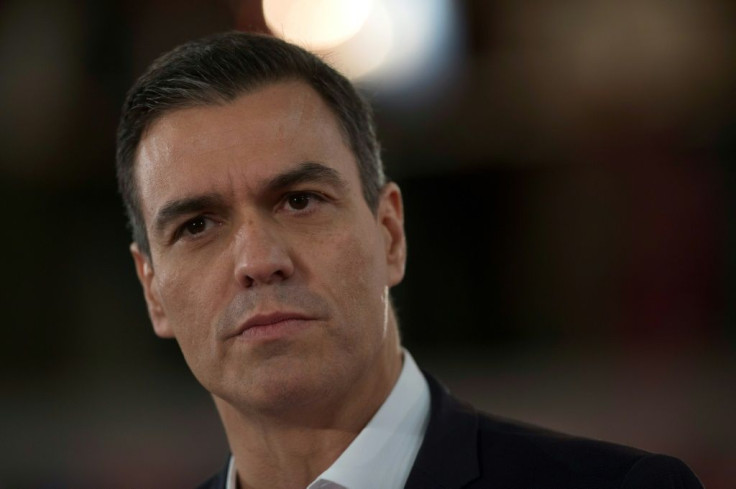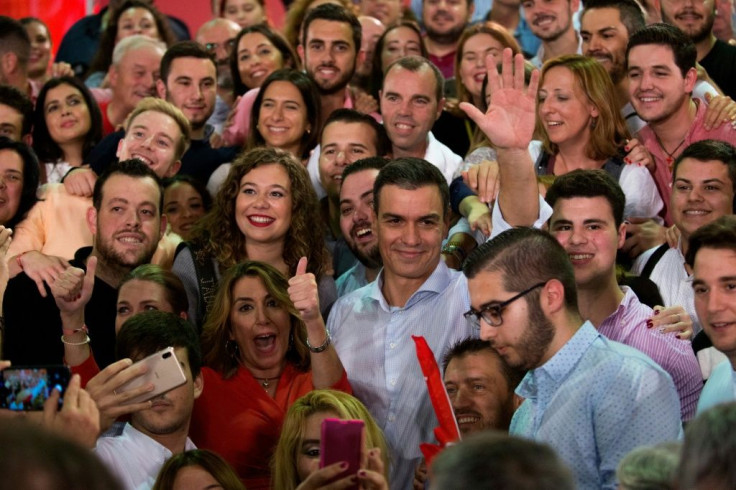Pedro Sanchez, Tenacious Survivor Of Spanish Politics

A former basketball player, Spain's Socialist leader Pedro Sanchez who was confirmed by parliament Tuesday as prime minister for another term is a tenacious risk-taker who has survived a rollercoaster political career.
He had hoped to boost his party's standing in a November 10 general election but instead the Socialists emerged winners but weakened, taking 120 seats in the 350-seat parliament -- three fewer than in April polls.
But this was just another hurdle to overcome for this Madrid-born economist who emerged from obscurity in 2014 to seize the reins of Spain's oldest political party.
Within 48 hours of the election, Sanchez struck a deal to form a coalition government with hard-left party Podemos, led by his foe Pablo Iglesias who will now be his deputy.
He then made a risky bet to secure the vital abstention of Catalan separatist party ERC for a confidence vote in parliament despite having hardened his stance against Catalonia's independence movement in recent months.
"He is a player ready to take risks who easily destabilises his adversaries," said Jose Ignacio Torreblanca of the European Council on Foreign relations.
Always immaculately suited and booted, this telegenic 47-year-old who likes to go running and looms over his rivals at 1.90 metres (6 foot, 2 inches) tall, has made a name for himself as stubborn and tenacious.
He is also the first Spanish premier to speak English fluently since the country returned to democracy in the 1970s.
Three years ago, he was written off as politically finished, ousted as party chief after leading the Socialists to their worst-ever electoral defeats in 2015 and 2016.
Just over six months later, however, he unexpectedly won his job back in a party primary election after a cross-country campaign in his 2005 Peugeot to rally support.
By June 2018, he had taken over as premier after an ambitious play toppled conservative PP leader Mariano Rajoy in a no-confidence vote.

But the fragile alliance that catapulted him to power cracked in February 2019, with the Catalan separatist lawmakers who had supported him rejecting his budget and triggering fresh elections in April, Sanchez's first as prime minister.
Although his Socialists won, they fell short of an absolute majority, and Sanchez was unable to secure support from other parties to win a confidence vote in parliament and stay on in power, prompting the repeat November polls.
Sanchez has detailed his triumphs in an autobiography called "Resistance Manual", the first to be published in Spain by a sitting premier.
A leap year baby who was born in Madrid on February 29, 1972, Sanchez grew up in a well-off family, the son of an entrepreneur father and a mother who worked as a civil servant.
He studied economics in the Spanish capital before getting a Master's degree in political economy at the Free University of Brussels and a doctorate from a private Spanish university.
Married with two adolescent daughters, Sanchez has been quick to cultivate his public image as a family man.
He describes himself on his Twitter handle as "Spanish prime minister and father," and frequently shares pictures on social media of himself jogging or playing with the family's water dog, Turca.
Politics, though, was always his passion.
He joined the Socialist party in his early twenties, then served as an opposition councillor in Madrid from 2004 to 2009, after which he entered parliament.
After taking over as premier, Sanchez implemented a series of eye-catching measures, appointing a cabinet with a majority of women, taking in migrants from the Aquarius rescue ship, and raising the minimum wage by 22 percent after years of austerity.
In October, he finally made good on a pledge to exhume the body of late dictator Francisco Franco from a grandiose state mausoleum, reburying it in a more discreet grave in a country still conflicted over the dictator's decades-long regime.
But his premiership has been overshadowed by the Catalan separatist crisis, which in October erupted into mass protests that turned violent after Spain's top court jailed nine regional leaders over a failed 2017 independence bid.
© Copyright AFP 2024. All rights reserved.





















